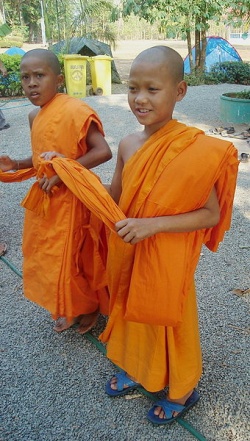Difference between revisions of "Śrāmaṇera"
(Created page with "thumb|250px|Śrāmaṇeras in Thailand A '''śrāmaṇera''' (Sanskrit; Pali: sāmaṇera; Burmese: ရှင်သာမဏေ shin tha...") |
|||
| Line 3: | Line 3: | ||
A '''śrāmaṇera''' (Sanskrit; Pali: sāmaṇera; Burmese: ရှင်သာမဏေ shin thamanei, Thai: สามเณร samanen, Khmer: សាមណេរ "samaner") is a novice monk in a [[Buddhism|Buddhist]] context. The literal meaning is "small ''[[śramaṇa]]''," that is, small renunciate, where "small" has the meaning of boy or girl. | A '''śrāmaṇera''' (Sanskrit; Pali: sāmaṇera; Burmese: ရှင်သာမဏေ shin thamanei, Thai: สามเณร samanen, Khmer: សាមណេរ "samaner") is a novice monk in a [[Buddhism|Buddhist]] context. The literal meaning is "small ''[[śramaṇa]]''," that is, small renunciate, where "small" has the meaning of boy or girl. | ||
| − | In the [[Vinaya]] monastic discipline, a man under the age of 20 cannot ordain as a [[bhikkhu|bhikṣu]], but can ordain as a śrāmaṇera. The female counterpart of the śrāmaṇera is the ''[[samaneri|śrāmaṇerī]]''. Śrāmaṇeras and śrāmaṇerīs keep the [[Ten Precepts | + | In the [[Vinaya]] monastic discipline, a man under the age of 20 cannot ordain as a [[bhikkhu|bhikṣu]], but can ordain as a śrāmaṇera. The female counterpart of the śrāmaṇera is the ''[[samaneri|śrāmaṇerī]]''. Śrāmaṇeras and śrāmaṇerīs keep the [[Ten Precepts|ten precepts]] as their code of behaviour, and are devoted to the [[Buddhism|Buddhist]] religious life during a break from secular schooling, or in conjunction with it if devoted to formal ordination. |
After a year or at the age of 20, a śrāmaṇera will be considered for the higher bhikṣu or [[bhikkhuni|bhikṣuṇī]] ordination. Some monasteries will require people who want to ordain as a monk to be a novice for a set period of time, as a period of preparation and familiarization. Adults would normally wear the white robes of a Brahmin, as do [[mae ji]], who do not seek ordination. | After a year or at the age of 20, a śrāmaṇera will be considered for the higher bhikṣu or [[bhikkhuni|bhikṣuṇī]] ordination. Some monasteries will require people who want to ordain as a monk to be a novice for a set period of time, as a period of preparation and familiarization. Adults would normally wear the white robes of a Brahmin, as do [[mae ji]], who do not seek ordination. | ||
Revision as of 04:37, 12 January 2013
A śrāmaṇera (Sanskrit; Pali: sāmaṇera; Burmese: ရှင်သာမဏေ shin thamanei, Thai: สามเณร samanen, Khmer: សាមណេរ "samaner") is a novice monk in a Buddhist context. The literal meaning is "small śramaṇa," that is, small renunciate, where "small" has the meaning of boy or girl.
In the Vinaya monastic discipline, a man under the age of 20 cannot ordain as a bhikṣu, but can ordain as a śrāmaṇera. The female counterpart of the śrāmaṇera is the śrāmaṇerī. Śrāmaṇeras and śrāmaṇerīs keep the ten precepts as their code of behaviour, and are devoted to the Buddhist religious life during a break from secular schooling, or in conjunction with it if devoted to formal ordination.
After a year or at the age of 20, a śrāmaṇera will be considered for the higher bhikṣu or bhikṣuṇī ordination. Some monasteries will require people who want to ordain as a monk to be a novice for a set period of time, as a period of preparation and familiarization. Adults would normally wear the white robes of a Brahmin, as do mae ji, who do not seek ordination.
Ordination differs between śrāmaṇeras and śrāmaṇerīs.
